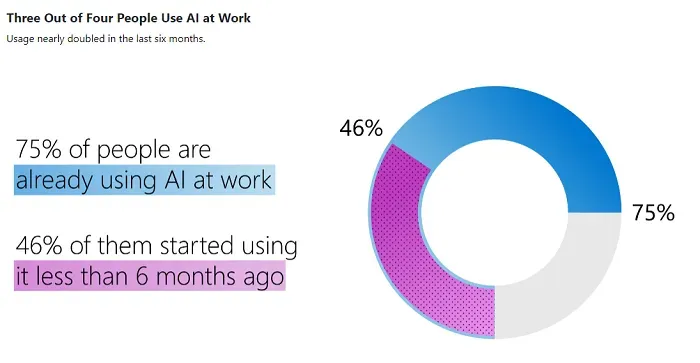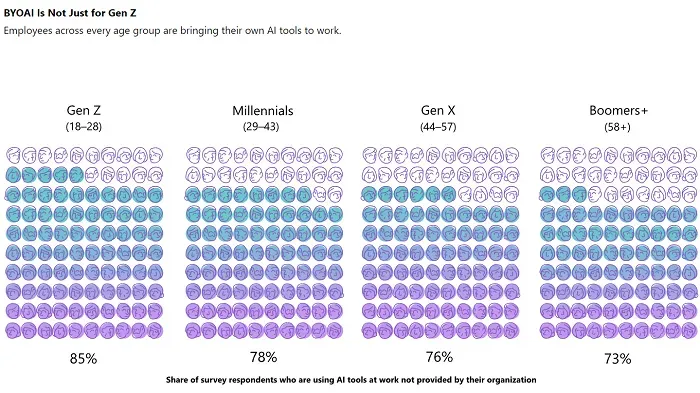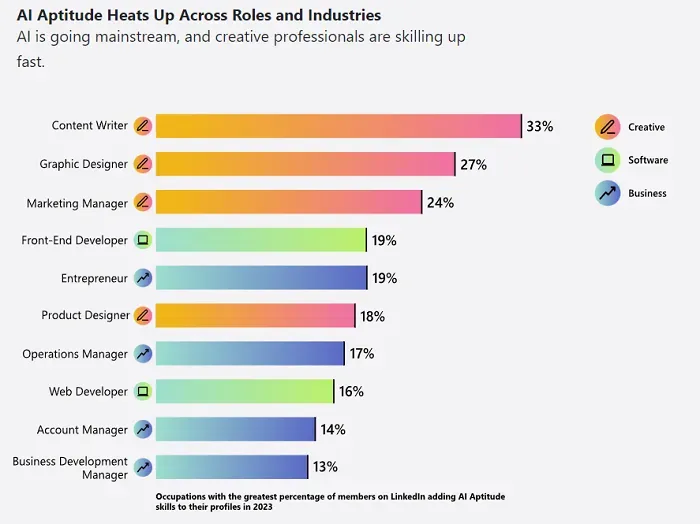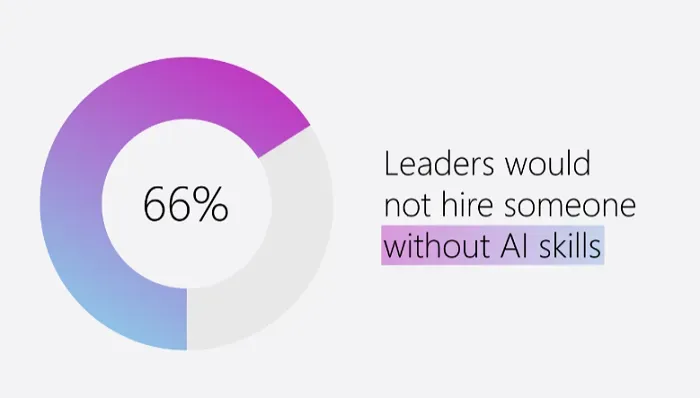2024 Work Trend Index Annual Report By Microsoft & LinkedIn
- LinkedIn Strategy
In 2024, the use of generative AI at work has become a defining trend across the world. According to the 2024 Work Trend Index Annual Report from Microsoft and LinkedIn, the utilisation of artificial intelligence by global knowledge workers has nearly doubled in the past six months, with 75% now integrating AI into their daily tasks. This shift indicates that AI is no longer a futuristic concept but a present-day reality reshaping the workplace.
The Rise of Generative AI in the Workplace
Employees are increasingly leveraging AI tools to manage the growing pace and volume of work. The report highlights that a significant portion of workers, overwhelmed by their workload, are taking matters into their own hands by bringing their own AI tools to work. This trend, known as Bring Your Own AI (BYOAI), is prevalent across all generations, not just Gen Z. Approximately 78% of AI users are introducing their own AI solutions, especially in small and medium-sized companies.
In the realm of recruiting, new AI-powered tools like 'Recruiter 2024' and 'LinkedIn Recruiter' are transforming the way people are recruited, hired, and learn by automating many time-consuming tasks.
Interestingly, this grassroots adoption of AI is occurring despite a lack of official guidance or support from many organisations. This behaviour underscores a critical gap between the availability of AI tools and the strategic implementation needed to harness their full potential safely and effectively.

Benefits and Challenges of AI Integration
The report presents compelling data on the benefits AI brings to the workplace, notably how it can boost efficiency for users. A large majority of users report that AI is helpful in allowing them to save time (90%), focus on their most important work (85%), be more creative (84%), and enjoy their work more (83%). These advantages are particularly evident among the heaviest users of Microsoft Teams, who utilise AI-powered tools like Copilot to summarise extensive meetings, effectively saving an entire workday each month.
That said, there are significant challenges. While 79% of leaders agree that adopting AI is essential to stay competitive, 59% struggle to quantify the productivity gains from AI, leading to hesitation in broader AI implementation. This uncertainty is exacerbated by the difficulty in measuring the impact of AI on job posts and the workforce, alongside concerns over cybersecurity and data privacy, especially given that many employees use AI tools without official sanction.

AI and the Future of Work: Impact on LinkedIn Profiles
AI is not only transforming current roles but also reshaping the job market. Leaders are increasingly prioritizing AI skills when hiring, with 66% stating they would not hire someone without AI proficiency. Moreover, 71% of leaders are inclined to choose less experienced candidates with AI skills over more experienced ones without such capabilities. This shift highlights the growing importance of AI literacy as a critical career skill, with recruiters now leveraging new AI-powered tools across recruiting and marketing products to automate and improve tasks such as messaging, search, and analysis.
For employees, this means that AI can potentially elevate their career prospects. Many workers believe that AI skills can help them get promoted faster and broaden their job opportunities. Consequently, there has been a significant increase in the number of professionals seeking AI training and adding AI-related skills to their LinkedIn profile. Showcasing these skills on professional profiles like LinkedIn is becoming crucial for visibility, reach, and demonstrating AI capabilities to hiring managers and recruiters.

Moving Forward: Strategic AI Adoption and Skills Development
To fully capitalise on the potential of AI, organisations need to move beyond experimentation and towards strategic implementation. This involves not only recognising the immediate benefits of AI but also addressing the broader implications for business transformation. Leaders must develop clear plans and visions for AI integration, ensuring that their teams are equipped with the necessary skills and tools to use AI effectively. AI's role in enhancing business connections through improved ability to respond and invest in relationships is becoming increasingly crucial.
The 2024 Work Trend Index highlights a pivotal moment in the integration of AI into the workplace. While the adoption of AI offers numerous benefits, it also presents challenges that require thoughtful and strategic approaches. Organisations that successfully navigate these complexities will be well-positioned to leverage AI for sustained growth and innovation.

For more insights and a detailed analysis, visit the 2024 Work Trend Index Annual Report by Microsoft and LinkedIn.


